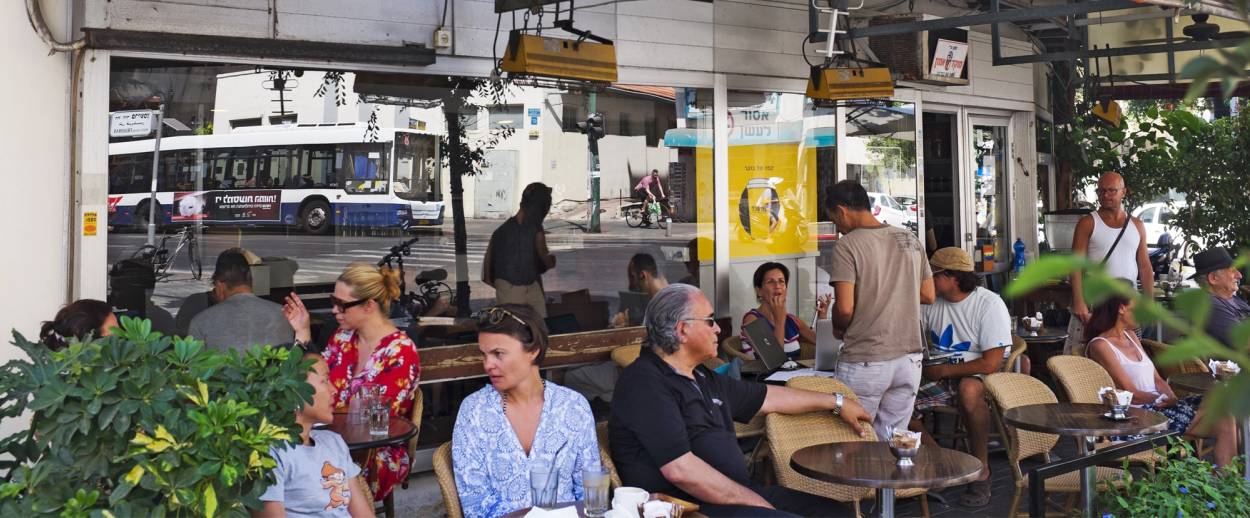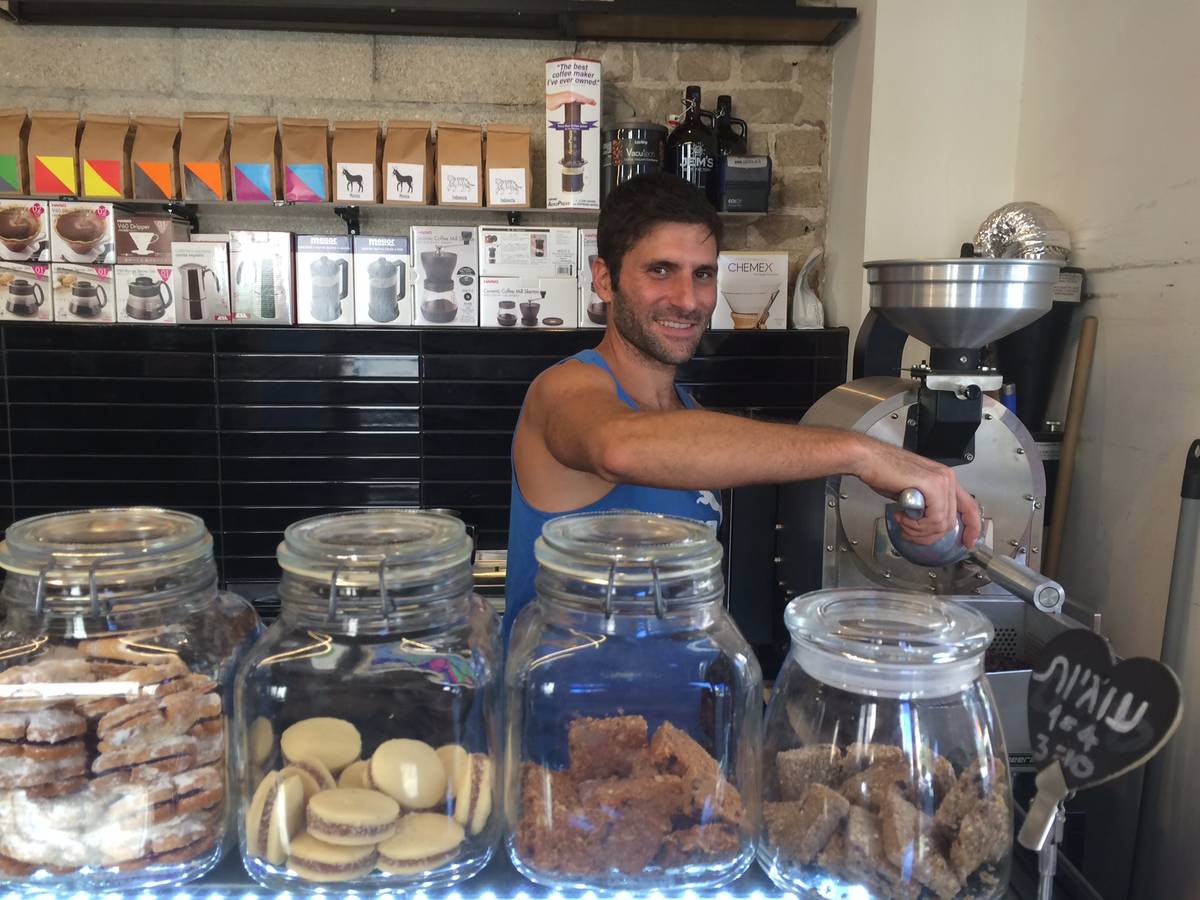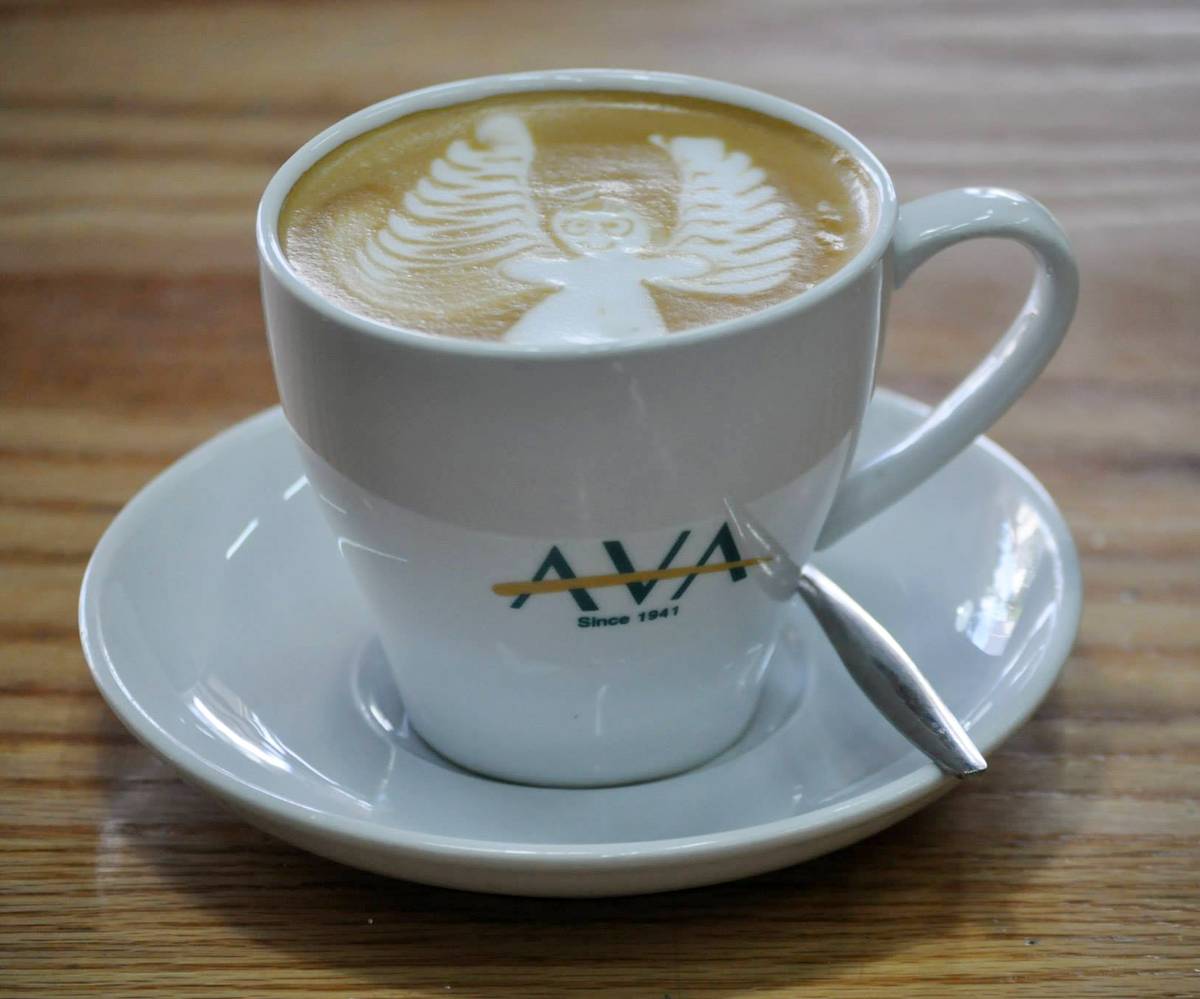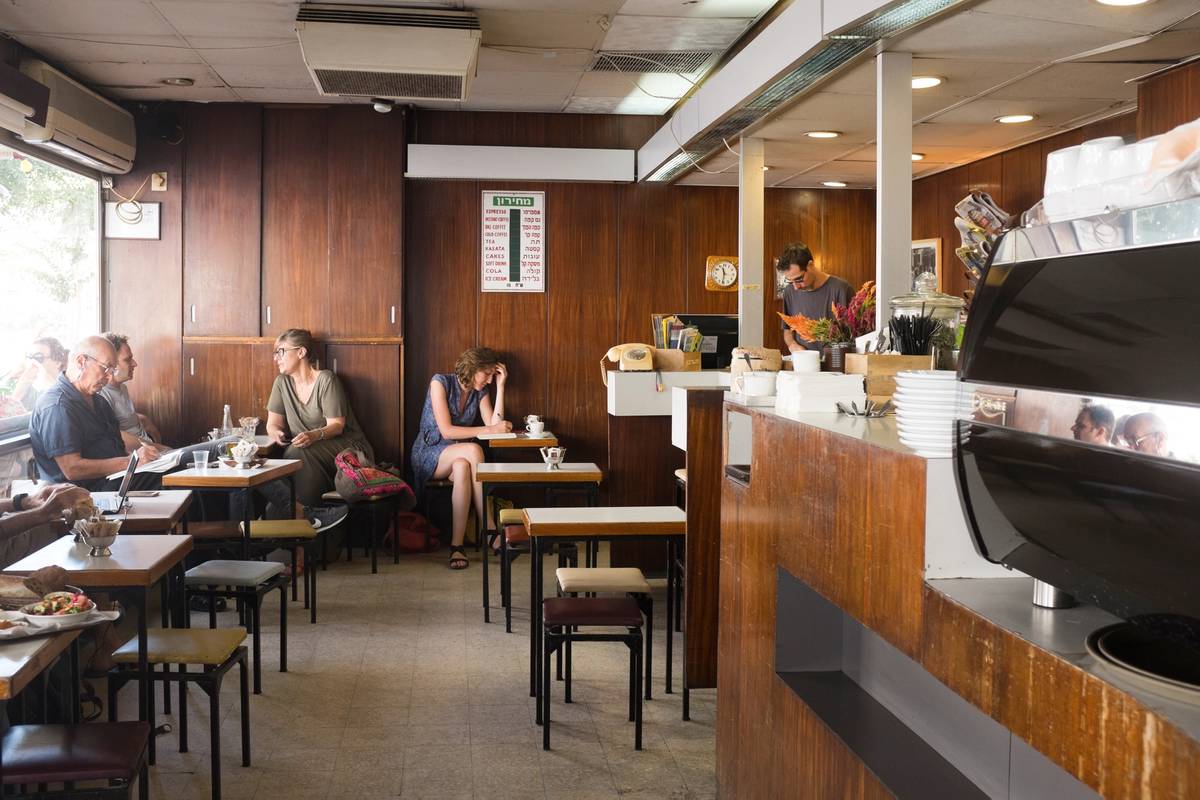From the Ground Up
Whether it’s to work or to play, Israeli life is built around coffee. Here are some of the best places to refuel.




Coffee has always been a popular drink in Israel, whether it was the instant coffee that Elite started manufacturing in familiar red tins in 1958, or café hafuch—literally upside-down coffee, an Israeli twist on cappuccino.
But in recent years, Israelis have started drinking more good coffee than ever before. Today, Israelis enjoy a wide range of coffee, at a variety of cafés that serve up different blends and different vibes.
For Israelis, coffee is more than a drink. It’s what brings people together—at sidewalk cafés, on an open veranda, in a chic little spot in the city—to talk with friends, relax with co-workers, discuss politics and culture, or tap away at laptop computers. And each type of coffee helps create a different kind of café, and a different kind of atmosphere for socializing.
Contrary to what tourists might expect, there are only a few cafés—mainly in Jaffa or Akko—where you can smoke a hookah and drink Turkish coffee, cooked in a small metal pot called a finjan. Israelis enjoy Turkish coffee, but more typically as a complementary drink served with baklava at some Mizrahi restaurants. And you won’t find much black coffee in Israel’s trendier European-style cafés, either: Israelis drink it, but more often at home, in the office, at proper restaurants, or (accompanied by a cigarette) in the army.
“Israeli coffee culture today is based on European and especially Italian coffee culture, much more than Middle Eastern coffee culture,” said Rita Goldstein, food writer at Mako. “Black and Turkish coffee are popular, but less than cappuccino and espresso, at least in cafés.”
Most cafés across Israel serve imported Italian coffee, which Israelis have loved ever since Mordechai Shor started manufacturing the first Israeli espresso machine, called “La Favorita,” in the early 1950s. Shor’s espresso machines were a great success, and young Israelis started hanging out in cafés. In 1960, when Israel had just come out of a 10-year regime of austerity, Knesset member Yizhar Smilansky—known as a writer by his pen name S. Yizhar—denounced the young generation’s hedonism and coined the term “the espresso generation.”
Today in Tel Aviv, Jerusalem, and a growing number of locations across the country, you can also find coffee shops that belong to the third-wave coffee movement, which views coffee as a quality artisanal product; these outlets sell only 100% Arabica blends or Arabica single-origin coffee, and roast their own beans. “In the early 2000s, people around the world started drinking lighter roasts, which have a more complex flavor,” said Ofir Ben Harush, one of the owners of third-wave Israeli coffee chain Cafelix. In the last few years, he noted, this trend has come to Israel, with cafés like Coffee Lab, Mae Café, Loveat, and his own Cafelix.
American coffee hasn’t gained a major foothold in Israel; Starbucks, for instance, tried to enter the market but closed all its stores after two years. But where Starbucks failed, local chain Aroma Espresso Bar, founded in 1994 in Jerusalem, has succeeded, offering a wide range of food—from cookies and burekas to soups and sandwiches—and fresh juices and milkshakes, in addition to coffee. You’ll find Aroma outlets across the country—even at gas stations. (Aroma has also opened branches in the U.S.) Other coffee chains in Israel include Arcaffe—a more upscale version of Aroma—Café Hillel, and Ilan’s.
It’s impossible to ignore the new phenomenon of Cofix, a budget chain established in 2013. Boasting a fixed price of 5 shekels ($1.33) for its coffee, it has already opened more than 100 branches across the country and caused takeaway coffee prices in Israel to go down across the board.
Here are a few of the country’s best cafés, where you can sample the best coffee Israel has to offer.
Cafelix
Originally established by Philip Shefer, who came from Germany and converted to Judaism, and his wife, Yael, Cafelix is one of the pioneers of the third-wave of coffee in Israel, and was described as “the best cup of coffee in the country” by Haaretz. Its first espresso bar opened in Jaffa in 2011, and since then, Ofir Ben Harush, one of the owners, established three more branches in Tel Aviv and one in Jerusalem, importing “specialty coffee” raw beans and roasting them in-house.

Cafelix is not a chain in the traditional sense but more like a chain of small neighborhood espresso bars; neighbors get a personal cup and a big discount, and the barista knows them by name and exactly how they drink their coffee. People from the neighborhood meet at Cafelix every morning or during the day and sit for hours to work on their laptops.
Since the essence of Cafelix is the coffee, it doesn’t serve much food—just a few pastries, cookies and cakes, and sandwiches in the morning. “We don’t prepare food here because we’re all about the coffee, and food takes the focus away from the coffee,” Ben Harush said. “The day a tomato will be sliced here, I’ll cut my arm off!”
Cafelix Purple Square (15 Sgula St., Jaffa); Cafelix Shlomo Hamelech (12 Shlomo ha-Melekh St., Tel Aviv); Cafelix Levinsky (6 Merkhavya St., Tel Aviv); Cafelix (12 Johanan HaSandlar St., Tel Aviv); Cafelix Mahane Yehuda Market (20 HaAfarsek, Mahane Yehuda Market, Jerusalem)
Café Mizrahi
One of the loveliest places to take a break during a visit to the Mahane Yehuda market is Café Mizrahi, a modern espresso bar with a French patisserie. Eli Mizrahi, whose father and grandfather also worked in the market, opened the café with his daughter, Moran, who studied pâtisserie (pastry making) at Le Cordon Bleu in Paris. They opened the café in 2002, during Jerusalem’s worst period of terrorist attacks, but they knew that in order for the market—which is more than a century old—to continue living, it needed new places and new ideas.
Café Mizrahi, 12 Hashazif, Mahane Yehuda Market, Jerusalem

Café AVA
Café AVA is a veteran establishment in the north of Israel. AVA opened in 1941 as a roasting house in downtown Haifa. Then came its factory outlet, which sells freshly roasted coffee to private clients as well as cafés and restaurants, and in the mid-1960s AVA’s café opened, serving the best coffee to Haifa’s working class. AVA’s roasting house, shop, and café are all still open. You can get sandwiches (including a great bagel and lox), baked goods, and breakfast with your coffee.
Café AVA, 51 Derech HaAtsma’ut, Haifa
Basma—Grandma’s coffee
Owner Alia Abou Shmeiss opened her café in 2014 as the sitting room of a fictional character named Grandma Basma, whose back-story fuels the atmosphere of the café, designed in the style of old Jaffa. According to the story, Basma—meaning “smile” in Arabic—was a little girl in Jaffa in 1914 and she sat next to her father, who roasted coffee for the merchants and smiled at them. Abou Shmeiss holds hospitality above all: “I enjoy talking with the clients, telling them about Jaffa, about coffee, and about multiculturalism,” she told me. At Basma, you can drink Turkish coffee the traditional way and see how it is prepared on hot sand, while all coffee is served with Oriental sweets such as baklava, ma’amoul, and knafeh. Basma is also a restaurant, serving Arabic food and dishes from Jaffa.
Basma—Grandma’s coffee, 5 Louis Pasteur, Jaffa

Café Mersand
The best place to have coffee after the beach in Tel Aviv is Café Mersand, at the corner of Frishman and Ben Yehuda Streets, a five-minute walk from the beach. Mersand was established in 1955 by Walter Mersand—his name means “sea sand” in German—who made aliyah from Austria in the 1930s. The place was designed by a Hungarian architect, and the idea was to recreate a traditional European café in Tel Aviv. Since it was located on “Ben Yehuda Strasse”—the area where most German Jews settled in Tel Aviv—Mersand was a haven for Tel Aviv’s yekke population. The café was run for many years by Mersand and his wife, and then by their son, Mike.
As a kid, Boaz Tregerman used to ditch school to go to Mersand for cheesecake. In 2005, when he heard the place was closing down, Tregerman—who already owned another successful café in Tel Aviv called Baccio—decided to save it. He took over, and except for adding DJs on Friday afternoons, he left it exactly the same, including the original decor and Austro-Hungarian cakes, such as Gerbeaud Slice (zserbó in Hungarian). Today, young hipsters and artistic types frequent Mersand, as well as surfers, people coming from the beach, and 80-year-old yekkes from back in the day.
Mersand, 18 Frishman St., Tel Aviv
Café Goferman
If you want a rustic atmosphere with your coffee, Café Goferman, which actually is more of a bistro, is a beautiful and serene rural café in Rishpon, a moshav in the Center District of Israel. Sitting on an outdoor wooden deck in the middle of nature, Café Goferman offers a peaceful experience with a rustic atmosphere that feels miles away from most urban cafes. (At the moment it is closed for renovation, but soon it will reopen.)
Café Goferman, 12 Ha-Prakhim St., Rishpon
Tmol Shilshom
This kosher café and bookstore serves real restaurant food: various types of shakshuka, beet gnocchi filled with cream cheese and pistachios, or salmon fillet roasted in a red-pepper and butter sauce with pumpkin cubes and Swiss chard. Located in a 130-year-old building in Jerusalem’s Nahalat Shiv’a neighborhood, it opened in 1994 and was named after an S.Y. Agnon story. True to its name, it hosts literary and cultural events.
Tmol Shilshom, 5 Yo’El Moshe Salomon, Jerusalem
—Dana Kessler
This article has been sponsored by the Israel Ministry of Tourism. For more great Israel travel ideas, visit Israel: Land of Creation. (Follow them on Facebook and Twitter, too!)